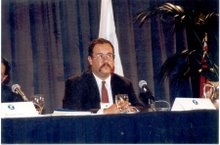The Road Out of Iraq Leads Through New York
By David Gowdey
The farcical notion that a military escalation will result in positive change in Iraq is just the latest example of the neo-conservative disconnect from reality that has made this Administration such a foreign policy disaster. Like an ostrich sticking its head in the sand, the Administration is doing its best to evade the obvious in Iraq. What's obvious to the rest of the world, and to the majority of the American public, is that a wrongheaded strategy and four years of mismanagement has made "victory" in Iraq impossible. The problems in Iraq can not be solved with military force because they are political problems that require a political solution. Ultimately, the road out of Iraq is going to lead through New York, and the sooner we get on that road the better.
From the beginning, the Administration and the conservative establishment has wrongly viewed the situation in Iraq, and the larger "war on terror" as military confrontations with political aspects rather than what they truly are - political confrontations with military aspects. As a result, in their over-reliance on military force, and their failure to implement serious, successful efforts at economic reconstruction and political reconciliation, the Administration has squandered whatever goodwill the US may have earned from deposing Saddam Hussein. The US not only created the conditions for the current Iraqi civil war to take place, it has become a de facto party to it.
In choosing to invade Iraq in the first place, the Administration and its neo-conservative policy architects made the fundamental mistake of believing that serious political and economic issues can be solved primarily through the application of military force. Modern history teaches us that this is rarely the case, and the past three years have shown us that it is certainly not the case in Iraq.
The question we are faced with now is not how to "win" in Iraq, because victory has been made impossible. It's how to get out in a way that doesn't leave Iraq a festering wound on the international body politic, breeding international terrorism; and how to minimize the considerable damage to perceptions of America and American power that the Iraq war is causing. The longer we wait, the more difficult that objective will be to achieve.
Major General Richard Dannatt, Chief of Staff of the British Army, recently summarized the dilemma that our past policies have created. In a newspaper interview with the Daily Mail he correctly stated that the presence of British troops in Southern Iraq exacerbated the security situation. This is true for American troops as well -we have become part of the problem rather than part of the solution.
The political aspects of the Iraq war have been consistently botched by the Bush Administration. In their actions and comments since the invasion in 2003, the Administration has consistently sent a clear message that they intend for American troops to stay in Iraq, and for America to influence Iraqi politics and oil production, for a long time to come. The huge new American Embassy, with its facilities for thousands of American personnel, is a visible example of this intent. This message was singularly unsuited to a country that lived for centuries under Ottoman and British colonial occupation, and its implications have not been lost on the Iraqis.. Even those Iraqis who hated Saddam have little desire to live under long term American occupation and influence. As a result the most important war we are now waging in Iraq isn't against international terrorism as the Administration believes and claims, it is against Iraqi patriotism and self determination. That is a war that the US ideologically should not be fighting, and in the long run, one that we can not win.
At the same time, a US policy that focused on sectarian politics and bolstered Shiite power to counter Sunni support for the insurgency, strengthened the sectarian divisions within the country and broke down the social order. As a result, US military forces are now fighting a guerrilla war in the midst of the Iraqi civilian population engaged in their own civil war. Moreover, our support of a blatantly partisan government so closely linked to Shiite militias has destroyed any vestige of credibility the US may have had left with the Sunni population. We have, in essence, become a party to the Iraqi civil war-supporting a government of dubious legitimacy, most of whose members do not like us and will not support us when the war is finished.
The only way for the US to get out of Iraq without leaving the country an utterly failed state and a breeding ground for international terrorism is for there to be a political reconciliation between the warring sides in the Iraqi civil war. This would isolate the relatively minor Al Quaeda contingent, and make their defeat or containment an achievable objective. This is still possible, as long as a negotiated US withdrawal is one of the elements of any agreement. However, the longer sectarian violence continues in Iraq, and the more entrenched the sectarian hatreds become, the less possible such a political reconciliation becomes. This is why any new US policy for Iraq needs to urgently focus on the creation of a political reconciliation process that will put an end to the Iraqi civil war.
Regional efforts to create such a political process, which are currently generating much discussion, are unlikely to succeed. Both Syria and Iran see some current advantage to having the US stuck in an Iraqi quagmire. Having the US military bogged down in Iraq, and US diplomatic influence crippled by the continuing war, makes it easier for Syria to pursue their own agenda in Lebanon, and for Iran to pursue its nuclear weapons program. It is unlikely that either of these countries, despite their public pronouncements, will be reliable partners in any attempt to find a political solution to the problems in Iraq.
The truth is that the future of post-Saddam Iraq is up to the Iraqis, not the Americans. Whether Iraq becomes an Islamic fundamentalist state, whether it descends into civil war, or splits into three, the outcome is no longer in our hands-if it ever was. Only the Iraqi people can make those decisions, and we need to turn the decisions back over to them. This needs to be the focus of the new American policy. We need to be looking at a political offensive in Iraq, not a military "surge."
However, it's important we recognize that the price that we will have to pay to put Iraq back together is going to have to be the complete departure of American troops and the American military presence from Iraq. We will not be able to maintain permanent military bases or an embassy presence of thousands of personnel as the Administration desires. That will be the inevitable price for Sunni and insurgent participation in the process. It is best that we negotiate this now, while we still can make some political capital out of such a withdrawal. The longer we wait, the less likely the chance for a reasonable withdrawal.
Ultimately, the only way achieve an Iraqi political reconciliation is going to be through a truly impartial national political process, starting from ground zero, that includes all sectors of Iraqi society. We are going to have to go back to the political drawing board - and all of the political structures established under American influence, such as the new constitution and the government will have to be reaffirmed or discarded by the Iraqi voters in this new process. Moreover, because Americans are now seen by so many Iraqis as imperialist aggressors, we can have no part in such a political process. US participation or overt influence would reduce the credibility of the process to zero. The only international body that has both the diplomatic skill and resources to hold successful reconciliation talks, and the manpower and experience to oversee impartial national elections of the size that would be needed in Iraq, is the United Nations. This is why, ultimately, the best road out of Iraq leads through New York. Whether we're wise enough to take it remains to be seen.



No comments:
Post a Comment